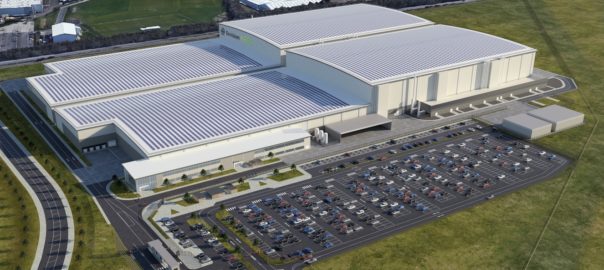Image credit: Nissan and Envision AESC
Nissan has unveiled its £1 billion flagship Electric Vehicle (EV) Hub in the UK, Nissan EV36Zero, driving carbon neutrality and establishing a world-first EV manufacturing ecosystem.
The project was launched by Nissan, Sunderland City Council and Envision AESC, a green-tech battery manufacturer.
“This project comes as part of Nissan’s pioneering efforts to achieve carbon neutrality throughout the entire lifecycle of our products,” Nissan president and chief executive officer Makoto Uchida said.
“Our comprehensive approach includes not only the development and production of EVs, but also the use of on-board batteries as energy storage and their reuse for secondary purposes.”
“Nissan’s announcement to build its new-generation all-electric vehicle in Sunderland, alongside a new gigafactory from Envision-AESC, is a major vote of confidence in the UK and our highly-skilled workers in the Northeast,” UK prime minister Boris Johnson said.
“Building on over 30 years of history in the area, this is a pivotal moment in our electric vehicle revolution and securing its future for decades to come.”
Building on Nissan’s manufacturing history, the project represents 6,200 jobs at Nissan and its UK suppliers and over 1,650 new jobs at Nissan and Envision AESC. In the long term, the project will modernise and expand the company’s EV production capability in the UK.
Nissan will also invest up to £423 million to produce a new-generation, all-electric vehicle, building on Nissan’s expertise in crossovers and the success of the Nissan LEAF. Designed for global markets, the new crossover will be built on the Alliance CMF-EV platform with a forecasted production capacity of up to 100,000 units to be installed.
More details about the new vehicle, including pricing and technology, will be released closer to the car’s sales launch.
Envision AESC will monitor and optimise energy consumption, manufacturing and maintenance with AIoT technology. This will boost battery production, powering up to 100,000 Nissan EVs per year.
Supporting the new model allocation, Envision AESC will invest £450 million to build the UK’s first gigafactory on the International Advanced Manufacturing Park (IAMP), powered by renewable energy.
The new gigafactory will increase the cost-competitiveness of EV batteries produced nationally through a new Gen5 battery cell with 30 per cent more energy density, improving range and efficiency. This will power Nissan’s new vehicles, making batteries cheaper and EVs more accessible to a growing number of customers in the future.
“Envision Group’s mission is to be the net zero technology partner of choice for global enterprises, governments and cities,” Envision Group founder and CEO Lei Zhang said.
“This commitment builds on our long-term partnership with Nissan to achieve our global ambition to make high-performance, longer-range batteries for EVs affordable and accessible for millions more motorists.
“Growth in demand could bring future investment of up to £1.8 billion, additional capacity of 25GWh and 4,500 jobs by 2030. This will put the Northeast at the heart of a new EV hub in the UK, collaborating on R&D around the whole battery lifecycle from storage to second life use, V2G smart charging and closed loop recycling,” he said.
Meanwhile, Sunderland City Council aims to deliver a 100 per cent renewable electric “Microgrid” to save 55,000 tonnes of carbon each year.
Incorporating the existing Nissan wind and solar farms, initial plans suggest there could be ten solar farms created with an anticipated 132MW generation and a direct connection to renewable energy from the grid.
This project includes plans for a 1MW battery storage system using second-life Nissan EV/Envision AESC batteries, allowing for excess energy generated during the day to be captured and used at another time to balance demand on the grid.
“We have a commitment to making Sunderland as a city carbon neutral by 2040 and electrification is a key part of that vision,” Sunderland City Council leader Graeme Miller said.
“Today’s announcement places Sunderland at the centre of electric vehicle production in Europe. It vindicates the unwavering belief this council has in the city’s ability to drive the electric revolution, working in partnership with the private sector and government to bring nationally significant projects to fruition; creating jobs and prosperity for our people and businesses and delivering cleaner, greener cars in the process.”
